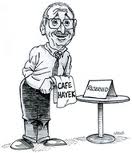 An open and earnest question for our President and any minimum wage supporters from Don Boudreaux at Cafe Hayek:
An open and earnest question for our President and any minimum wage supporters from Don Boudreaux at Cafe Hayek:
If a government policy that artificially raises the price of Chinese-made tires reduces the quantities of such tires that are bought, why does a government policy that artificially raises the price of low-skilled labor not reduce the quantities of such labor that are hired?
Fascinating.

Because economics is complicated, and simple basics about supply and demand don’t work as expected in the real world because of that complexity, and power differentials.
Consider this: back in the early industrial revolution the wage of workers was set based on how little factories could pay and still have the workers healthy enough to work. When the price of food went down, they could drop the pay. When the price of food rose, they would have to increase pay (or else have sick ineffective workers). The workers lived in squalor and filth, their children had no education because they had to work starting at age 10, but they were kept just healthy enough to keep producing for the owner.
Increasing or decreasing the wage had little to no effect on the number of people working because there was an oversupply of labor. The factories could set the wages as they wished, workers had no choice but to accept (well, the other choice was to have their family starve). The labor market is not a market of free individuals, there is a power differential.
Fast forward to today. Up until about 1991 productivity increases led to a proportional increase in worker pay. However, since then technology has led to a vast increase in productivity, with almost all of the new profits from that going to the owners and not the workers. This means wealth has increased dramatically for shareholders and the already wealthy, while the middle class has stagnated. Yet despite more productivity, the number of workers needed remains relatively constant. If anything, there now is again an oversupply of workers, meaning owners can pay what they will, there is nothing driving up the price of labor.
So, if minimum wage goes up, most places will simply keep the workers they have and pay the higher wage. When I worked in a pizza place back when the minimum wage went up rapidly (from $2.10 to $3.65 in a short period of time) not only did new workers get raises, but those of us who were above minimum got a raise equivalent to the increase in the minimum wage. Nobody was fired. Hours were not cut. Labor costs as a percentage of expenses went up, but the work was needed to generate profits. As long as businesses can profit more from having the workers produce goods then they lose paying higher wages, they will keep labor levels constant.
Now I’m not saying for sure what the impact would be. But it’s not something that one can figure out with a glib example. You’d have to calculate the marginal value of labor vs. the increase in minimum wage. If someone making $8 an hour helps the company bring in $100 an hour, and cutting him would cut those profits. paying him $10 an hour would not endanger that job. FINALLY, the money paid to workers gets used to buy goods and services – and workers are more likely to directly stimulate the economy than investors. So that will also increase economic activity.
Because economics is complicated, and simple basics about supply and demand don’t work as expected in the real world because of that complexity, and power differentials.
I disagree.
The direct purpose of applying tariffs to Chinese tires is to increase the sales of American made tires. The higher the price the fewer Chinese tires will be purchased.
Why does this apply to tires but not to labor?
Consider this: back in the early industrial revolution the wage of workers was set based on how little factories could pay and still have the workers healthy enough to work. When the price of food went down, they could drop the pay. When the price of food rose, they would have to increase pay (or else have sick ineffective workers).
I agree with this practice.
Except that I don’t think that people will agree to work for squalor.
So, if minimum wage goes up, most places will simply keep the workers they have and pay the higher wage.
I don’t thin that this is true. Check the minimum wage study focusing on fast food joints in Jersey/Pennsylvania.